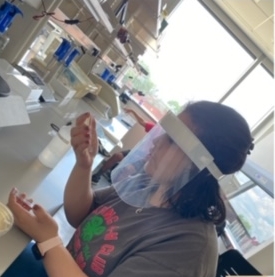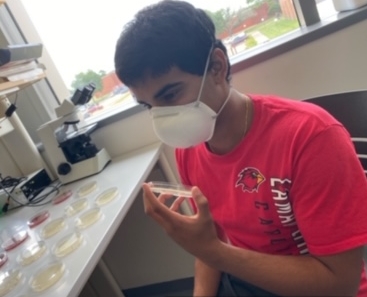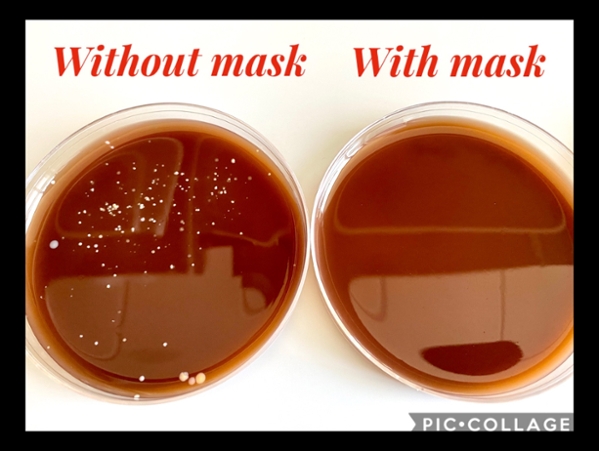Pandemic affords real-world microbiology lab
July 07, 2020 | by Shelly Vitanza
Although offering a face-to-face microbiology lab this summer wasn’t possible due to the COVID-19 pandemic, tasking a few students with a microbiology experiment in a lab was not only successful but relevant to the mask, no mask debate.
Lamar University’s Ashwini Kucknoor, associate professor of biology, assigned two Reaud Honors College students with testing the effectiveness of different kinds of face masks in her lab.
students with testing the effectiveness of different kinds of face masks in her lab.
“I wanted to give these students meaningful work, and this project was good for two reasons,” said Kucknoor. “It was a good experience for students to learn how to carry out the project and for them to educate their peers about what they learned about spreading microbes.”
During non-pandemic times, Kucknoor, the recipient of the LU David J. Beck Teaching Excellence Award in 2019, has offered a similar microbiology lab where students talk, cough and sneeze on plates and then study the microbes transmitted on those plates. This year, Kucknoor assigned the same lab but introduced several different kinds of masks into the project.
The students talked, coughed and sneezed on a plate without a mask. They then repeated their actions four times by talking, coughing and sneezing while wearing four different kinds of masks – a surgical mask, a homemade cloth mask, a face shield and an N-95 mask.
 “The project was interesting to me because it was testing a topic that seems to be a debate nowadays, unfortunately,” said Menna Elsaka, a senior on a pre-medicine track. “COVID has divided many people, and I thought masks were effective prior to the lab; now I absolutely think they are.”
“The project was interesting to me because it was testing a topic that seems to be a debate nowadays, unfortunately,” said Menna Elsaka, a senior on a pre-medicine track. “COVID has divided many people, and I thought masks were effective prior to the lab; now I absolutely think they are.”
The results revealed an alarming number of microbes and germs transmitted to the plates without a mask and an absence of bacteria transmitted when masks were worn.
 Both Elsaka and Vishal Mundodi, a junior biochemistry major also planning to be a medical doctor, who participated in the experiment, assumed masks were effective prior to the lab work but were surprised at the number of microbes released.
Both Elsaka and Vishal Mundodi, a junior biochemistry major also planning to be a medical doctor, who participated in the experiment, assumed masks were effective prior to the lab work but were surprised at the number of microbes released.
“I learned that if we are really serious about curbing the spread of the virus, masks are more than necessary and helpful in public situations,” said Mundodi. “The results show us how easily microbes and germs transfer and this was by performing simple acts everyone does multiple times a day.”
Both students found elements of the project surprising. “I was surprised to observe that a surgical mask was as effective as a N-95 mask in stopping the transmission of mouth bacteria,” said Elsaka, who is originally from Egypt but lives in Houston.
Mundodi said, “I did not fully comprehend how hard it is to fully stop the spread of microbes till I saw the results in front of my face. I think what is so interesting about the project is that we were just performing normal, necessary tasks by talking and coughing, but the amount of bacteria that grew on some plates was substantial and makes you think about how easily microbes are spread.”
The practical and relevant project took the students one step further. Working at different times and alone in the lab on the LU campus, students studied the microbes resulting from their talking, coughing and sneezing.
“I made them read up on particle size and size of the COVID-19 virus and the size of bacteria on the plates,” said Kucknoor. “There are certain species of bacteria growing in the mouth that are normal inhabitants, and it is these bacteria that are growing on the plates.”
is these bacteria that are growing on the plates.”
The students learned about these normal bacteria and most importantly learned about how easily these microorganisms can be transmitted when we talk, sing, cough and sneeze.
“The droplets that we generate carry these microorganisms, and indeed this is where the masks play a role in cutting the transmission by limiting the spread of the droplets, especially if one is infected with pathogens such as SARS-CoV-2 virus,” said Kucknoor. “The take home message for the students was that if you stop the droplet transmission by wearing masks, we can protect others from being infected, and, also protect yourself from others.”
Lamar University’s Ashwini Kucknoor, associate professor of biology, assigned two Reaud Honors College
 students with testing the effectiveness of different kinds of face masks in her lab.
students with testing the effectiveness of different kinds of face masks in her lab. “I wanted to give these students meaningful work, and this project was good for two reasons,” said Kucknoor. “It was a good experience for students to learn how to carry out the project and for them to educate their peers about what they learned about spreading microbes.”
During non-pandemic times, Kucknoor, the recipient of the LU David J. Beck Teaching Excellence Award in 2019, has offered a similar microbiology lab where students talk, cough and sneeze on plates and then study the microbes transmitted on those plates. This year, Kucknoor assigned the same lab but introduced several different kinds of masks into the project.
The students talked, coughed and sneezed on a plate without a mask. They then repeated their actions four times by talking, coughing and sneezing while wearing four different kinds of masks – a surgical mask, a homemade cloth mask, a face shield and an N-95 mask.
 “The project was interesting to me because it was testing a topic that seems to be a debate nowadays, unfortunately,” said Menna Elsaka, a senior on a pre-medicine track. “COVID has divided many people, and I thought masks were effective prior to the lab; now I absolutely think they are.”
“The project was interesting to me because it was testing a topic that seems to be a debate nowadays, unfortunately,” said Menna Elsaka, a senior on a pre-medicine track. “COVID has divided many people, and I thought masks were effective prior to the lab; now I absolutely think they are.” The results revealed an alarming number of microbes and germs transmitted to the plates without a mask and an absence of bacteria transmitted when masks were worn.
 Both Elsaka and Vishal Mundodi, a junior biochemistry major also planning to be a medical doctor, who participated in the experiment, assumed masks were effective prior to the lab work but were surprised at the number of microbes released.
Both Elsaka and Vishal Mundodi, a junior biochemistry major also planning to be a medical doctor, who participated in the experiment, assumed masks were effective prior to the lab work but were surprised at the number of microbes released. “I learned that if we are really serious about curbing the spread of the virus, masks are more than necessary and helpful in public situations,” said Mundodi. “The results show us how easily microbes and germs transfer and this was by performing simple acts everyone does multiple times a day.”
Both students found elements of the project surprising. “I was surprised to observe that a surgical mask was as effective as a N-95 mask in stopping the transmission of mouth bacteria,” said Elsaka, who is originally from Egypt but lives in Houston.
Mundodi said, “I did not fully comprehend how hard it is to fully stop the spread of microbes till I saw the results in front of my face. I think what is so interesting about the project is that we were just performing normal, necessary tasks by talking and coughing, but the amount of bacteria that grew on some plates was substantial and makes you think about how easily microbes are spread.”
The practical and relevant project took the students one step further. Working at different times and alone in the lab on the LU campus, students studied the microbes resulting from their talking, coughing and sneezing.
“I made them read up on particle size and size of the COVID-19 virus and the size of bacteria on the plates,” said Kucknoor. “There are certain species of bacteria growing in the mouth that are normal inhabitants, and it
 is these bacteria that are growing on the plates.”
is these bacteria that are growing on the plates.” The students learned about these normal bacteria and most importantly learned about how easily these microorganisms can be transmitted when we talk, sing, cough and sneeze.
“The droplets that we generate carry these microorganisms, and indeed this is where the masks play a role in cutting the transmission by limiting the spread of the droplets, especially if one is infected with pathogens such as SARS-CoV-2 virus,” said Kucknoor. “The take home message for the students was that if you stop the droplet transmission by wearing masks, we can protect others from being infected, and, also protect yourself from others.”